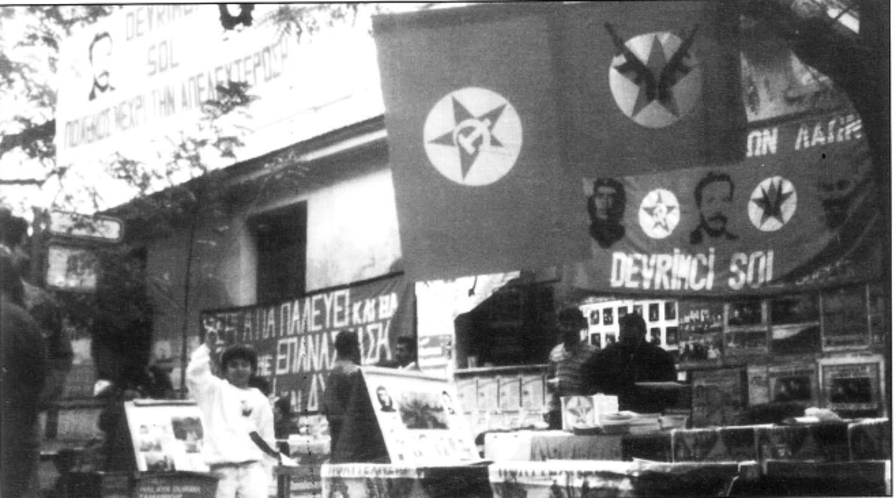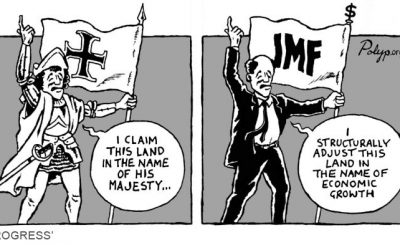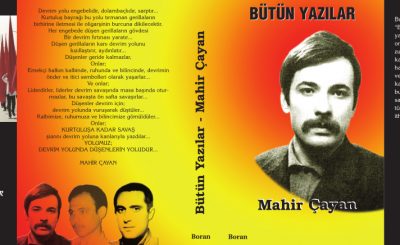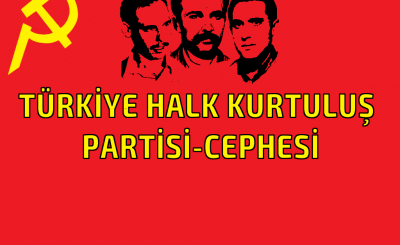In every workfield, in the regions and units, we have to organize ourselves in committees, cells and basic armed units. This is necessary for building a serious organisation in the fase of forming a party and, step by step, to professionalise these organs in practice. To achieve this, it is equally necessary to create the conditions for collective labour. Otherwise, if it is carried by individuals, who work as they please, the struggle will not yield the expected result. This will lead to sterility, individualism with a tendency towards autonomy. New people will not be trained, for others the road will even be blocked.
This implies the executing of wrong decisions.It is noticed that cadres who worked for a while, took individual decisions in their own work-field and refused to work collectively. Without any doubts, this is a characteristic of the petty bourgeois, taking arbitrary decisions and wanting to be free in ones own choices and behaviour. Maybe, individual decisions, for a while, can create manoeuvring-space, but in the long term they obstruct and transform into the negative. If we do not stop this behaviour, collective mechanisms can not be created and we will have no time for other problems. We constantly will have to deal with duchees. To get rid of this characteristic of the petty bourgeois, claiming responsibility but in the same time trying to avoid collective work and discipline, will only be possible in organised and collective labour.
We must not degenerate to an organisation like many before ours. In many former organisations people came together only schematicly, people were uninformed about the collective organisation, relations and details, splits occurred daily and certain elements instrumentalised the collective structures for their own split offs. Therefore, for the people who join, the membership of our organisation means collective labour. This must be teached in the current fase, we call the fase of building the party. This teaching will not be abstract but direct and orientated on the practice.
In this fase of building a party, the Central Committee deals with the questions: What kind of a party? What kind of struggle? What kind of revolution? Furthermore, it deals with the training of cadres and organising an according practice. The main objective is creating cadres and building the party. This must be done in such a way, that the appropriate revolutionary perspective, can be achieved versatily. Basic conditions: Organisation and ideological unity.
The Central Committee must not lead the movement in the wrong direction by holding elections etc in this fase of ideological unity, organisation and training of the cadres, the fase of building a party. In such a sensitive fase, using methods like elections, leads to discontent, ideological differences, petty-bourgeois behaviour, clique- building; the rise of liquidation-politics. This implies the extension of this fase.
Nowadays, in Turkey, there are many organisations who call themselves a party. They hold congresses everyday and claim they are organised on a base of elections. As we know them, these “organisations” and “parties” do not have the respect of the people, neither do they have forces inside the masses. So, they do not play any political role. Many of them are exile organisations. The elections for the separate party-organs do not take place in the way they report. Their structures are faraway from the seriousness from a revolutionary organisation. They bring together, at the most, two to five people for their “debates”. This looks like a caricature. If we don’t want to go the same way, we must take the building of the party very seriously.
Of course this does not mean the party becoming a fetish. But, without the knowledge about the membership of the organisation, about the collective labour, its grassroots and its ideological unity, this necessary step can not be taken.
Nowadays there is the idea, we made progress on the point of ideological unity. However, this is not the case. Ideological unity is not the same as repeating the abstract theory. When looked at from this perspective only, one could say the ideological unity has been reached years ago. This because there are very few, or even nobody, who abstract or theoretically differ in thinking. The principal side of it is to unite ideology with life, to dedicate to the cause, to create joint behaviour and trust. This can only be achieved by converting and testing theory into practice. Without the base from a organisation and having created its supporting and widening perspective, without the field of a core of trustworthy leading cadres who’s reliability and ideological unity is unquestioned, it is impossible to create a party or an organisation on the base of elections. This is a special situation which we can not explain with the scheme of common marxist-leninist organisational structures. Besides, we must not have ourselves put in that mould. In this fase trust in the central organisation and being centralistic is fundamental. Where there is no trust, it is inevitable that the search for right and justice alters in faulty behaviour; and these mistakes can not be prevented by written rules.
As long as the organisation, the creation of organs, the specialisation and the widening of the organisation has not reached the level that the struggle can be fought from the PASS-perspective (*), the building of the party can not be achieved. This fase must develop step by step. Those who do not recognise the will of the Central Committee and have ideological differences, stay outside this fase and outside our ranks.
When the Central Committee establishes that this fase is completed, there will be a conference in which the leading cadres of the organisation and several representatives of the regions and the organs will participate. The questions of the qualitative and quantitative condition of the organisation, the ideological structuring, the new election of the Central Committee, the tactics of the specific fase, will be discussed. The decisions from the participants of the conference will be summarized. The organisation will enter a new phase. This phase is the “organisation before the building of the party”, consequently the fase of building the party, stemming from the decision of the congress.
Before this congress, all the members and the organs of the organisation must follow the will of the central committee. Of course, this will shall not be a mechanism that gives orders, but it aims at ideological unity with its members, training them in the framework of participation and judging their opinions about the general problems in principal questions.
In the present phase we have to come out slowly from the traditional form of building the organisation. We have to reach the level where we determine the differences between members of the organisation, candidates and the differences between the sympatisers. Furthermore, we have to determine who is a member of the organisation and who is not, how the members of the organisation are choosen and which rules they have to follow. It’s necessary for the organisation in such a phase to orientate itself broadly. This to get rid of uncertainties and to rebuild all the sections from top to bottom.
Our organisation has to base itself on committees who collectively coordinate the legal and illegal sections. They have to organise on illegal foundations but conduct themselves according to the perspective not to exclude the legal platform. On the contrary, this has to be regarded as a very important section. That is why it is necessary that the illegal committees include comrades who work in the legal field. The danger of exposure has to be countered. That’s the reason for the necessary task, just as in the other sections, to specialise in evading prosecution by the police. Besides these massive efforts of specialisation, we must have couriers who can disguise themselves very good in practice and who are very well informed about police prosecution, and we have to create according institutions to reduce the riskfactor to the minimum.
It is from eminent importance to masterly combine the legality and illegality. When these conditions are not met, it is inevitable that a limited group of people will discuss in circles, in vain and sterile, and will not learn daily practice and it will slowly reach the point of not moving at all. What follows is the ideological split and building of cliques. We must increase our efforts to build an organisation which, within the framework of our theory of revolution, manages to reach the masses, despite the circumstances. Also, when there are no legal forms of struggle left. When the building of the organisation is not undertaken from this healthy perspective and not is prepared with the carefulness of an artist, the much discussed “increasing level of the struggle” will result in defeats. Of course, we will not fall into the false idea – first we must organise ourselves, then we will fight. But every action must have the function of bringing us further in economical, democratical and political-ideological sense and strengthen and broaden all our activities.
While on one hand the strategies of revolution are the decisive factors, on the other hand, we have to watch the reality in Turkey. We have seen several organisations, who could not bring together legality and illegality, either grew on an unorganised base, or separated themselves from the masses in the name of illegality, or were organisations with little participation from the masses. Still there are organisations with the these characteristics.
A good example is the shapeless and unorganized nature of Dev-Yol before the coup of 12 September. It was not clear who was a member of Dev-Yol and who was not. Because everybody who called him or her selves a member of Dev-Yol, did what he or she thought was right, a complete legalisation took place. Legality and arbitrary conduct of the cadres indeed creates a short time of a broad, but void development. On the long term des-organisation, inertness, cliquism and autonomous tendencies towards violence leads to total abolition.
As examples of organisations who consisted of a small group of people and were illegal, we have to name the TIKB and the DK. They had structures which, as a result of their theory of revolution, were abstract in relation to the masses and far away from the reality, they suffocated in illegal actions. They were not imbedded in the masses, neither did they have enough cadres. In the end, after a few battles, they could not avoid the edge of the abbeys.
When we do not create a professional organisation which aims at relations with the broad masses, we will become an organisation as we have seen so often, were negations like: isolating from the masses, falling into individualism, a hollow and inert broadening in the legal platform and/or self-righteousness in the organisation, prevail. It is almost impossible for such kind of organisations to create a collective conduct and to form a party.
Our organisation will be an organisation with rules. It will not decay into fetishism of these rules and the illegality. All comrades must be creative about the coordination of legality and illegality, without underestimating the enemy. They must successfully put our perspective into practice.
OUR UNDERGROUND-ORGANISATION WILL DEVELOP ITSELF IN THE REGIONS, IN THE CITIES, IN THE DIffERENT SECTIONS OF LABOUR AS COMMITTEES, ARMED UNITS, UNDER THE RESPONSIBILITY OF THE MILITARY COMMITTEES, BASED ON THE ARMED REVOLUTIONARY UNITS
THE COMMITTEES
The committees will be responsible for the activities in the regions, units and sections of labour. The persons in these committees are members of the organisation who understand Marxism-Leninism. They will be tested in different fields. There must be no doubts about their ideological unity with the organisation. They posses organisatorical skills which they use consciencely. Also, they are capable to tie up with the masses.
- The members of these committees are appointed by the central committee.
- The number of members of the committee rises or falls according to the conditions; consists however at least of three people. One of them is appointed by the Central Committee as political responsible.
- The committee decides collectively and divides the work needed to be done.
- In unclear and uncertain situations, during an action or under certain circumstances, when it is not possible the committee comes together, the political responsible, decides.
- The political responsible has the task to assemble the committee, to contact the movement and to pass on the directives and opinion of the movement to the committee. Furthermore it is their task to pass on the propositions and considerations of the committeemembers and lower units to the movement as desired. The political responsible, at the same time is the security responsible of the committee. He or she must inform the members how to avoid agents and spies infiltrating the movement, He has to inform them about prosecution by the police, instruments and how to use them, He or she has to train and check them.
- One member of the committee is responsible for the legal field. It is very important that the person responsible for the legal field possesses professional knowledge about police-prosecution. The common meetings with the member responsible for the legal field, can not be hold very often. However, for not preventing the communication, couriers must be used and good communicationsystems have to be developed.
- The person responsible for the legal field, has to form a legal committee. This committee is connected with leading committee by the member of the illegal committee and carries out its orders and considerations.
- Their will be cells, armed units and lower committees. They are connected with the committee- members.
- In the committee, he or she who has military experience, has to become the military responsible.
- The acceptance of new members, punishment, (temporarily) expelling of members, degradation to candidate member, deathpenalty, etc. etc. are controlled by the Central Committee. The committeemembers only may sanction people who committed a crime or arrest people who are suspected of being an agent or spy. In these cases, the Central Committee must be informed as soon as possible.
- Activities such as armed actions, campaigns etc. are not to be undertaken without control by the Central Committee.
- Illegal pamphlets, except those from the Central Committee, are signed by the regional committee. For example Devrimci Sol Ägäis/region committee.
- One member of the committee takes financial responsibility, controls all expenditures. When necessary he or she produces the documents.
- The committeemembers will not have detailed information about their mutual relations. Only the political responsible has to know the details.
- The responsible in the committee produces the personal notes about new members of the lower units and cells, their course of live, and activities he or she has participated in until that moment. When there are others who know the person it is about, they confirm these facts. The political responsible passes the information to the Central Committee.
- When the Central Committee agrees, the member or candidate member, starts with its task.
- The responsibility for the new-building or dismantling of a committee, is controlled by the Central Committee.
THE CELLS
We must organise, based on cells, to, under all circumstances, be capable of developing, the characteristics of a mass-movement and to be capable of creating and widening the ties the masses.
- The cells are founded by democratic mass-organisations into the factories, villages, city-quarters, streets, places of labour, thus in all fields. Generally, the cells consist of three persons and everybody is a member of the organisation.
- Every cell has a political responsible.
- When possible, the members of these cells are choosen from persons not known by the police.
- The cellmembers must have knowledge about fightingmethods. They must pass this knowledge to other members.
- Every cellmember founds new cells, which are connected via him or her.
The fields, the cells work in and what work they do, is defined by the committees. These cells have the task to spread the revolutionary propaganda in all the fields they work in. They must find new members, spread the publications of the movement. They must carry through internal trainings. These tasks differ according to the operationfields. - There can also be cells with a special task.
- The cells carry out the tasks they receive from the political responsible from the committee with which they are connected. The connection with the organisation is created by their political responsible.
- The individual cells do not know each other.
- Cells may not be founded, by using people working in the legal platform. In principle, members have to be found without relying on the legal responsible. Cellmembers can be legal, but their relations are secret.
- It is the task of every member to form cells in all the fields they work in.
ARMED UNITS
Armed units exist in the cities, the regions and fields of labour. They work according the cell-system. They are connected with the political- or military responsible from the committee they belong to. They carry out actions in the regions, fields and fields of labour. Members of the armed units are members of the organisation.
- Every armed action is done organised. Independent actions are not allowed.
- The members of the units for political activities, who work in the masses, protect their identity by secrecy.
- The plans for actions are made collectively. In an unclear situation they contact the higher committee, which decides. The armed must follow this decision. During the actions and/or in uncertain moments, the political responsible takes the decisions.
- The members of the armed units must specialise in weapons, explosives, sabotage and attacks. The military activities may not be seen as a simple task, they have to be looked at as creative assignments. Every member of the units is responsible for its own weapons.
WARNINGS
- To attract prosecution by the police, to endanger or reveal an operation.
- Open or secret cooperation with the police and thus treason.
- Not following the decisions of the organisation.
- Using the possessions and the prestige of the organisation for its own benefit.
- Hiding ones relations for the organisation.
- Cliquism, conspiracy and to work against the organisation.
- Exceeding competency, taking decisions about actions and endangering the organisation.
- To misconduct in male-female relations.
- These are serious crimes. Against these, the following punishments are imposed: deathpenalty, expulsion, temporary expulsion, warning and degradation to candidate-membership.
* according to Mahir Cayan, from “uninterrupted revolution: de strategy of the politised military war”




